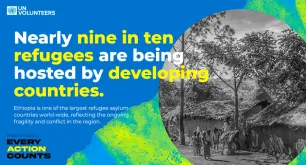Urvashi Bundel joined the UN Volunteers (UNV) programme in 2019 as an Associate Refugee Status Determination Officer at the Assosa sub-office of the UN Refugee Agency (UNHCR) in Ethiopia. On World Refugee Day, she shares what it is like to be a part of the refugee status determination process.
Identity, to me, is what we share when we introduce ourselves to others. It includes the traditions of our country of origin or the language we speak, our religious practices, family customs, hometown festivals and more. Now, imagine if your very identity was continuously challenged – only because you were forced to flee your place of origin due to precarious circumstances like war, political unrest or climate change. This is the reality that asylum seekers, refugees and anyone unwillingly displaced from home, face every day.
Refugees seek belonging and aspire to reclaim their identity with dignity. I am grateful to be serving them in their journey. -- Urvashi Bundel, UN Volunteer Refugee Status Determination Officer with UNHCR, Ethiopia
I’ve always been eager to work in the field of international criminal justice and protection. With the generous support of UNV, UNHCR and the active collaboration of the Ethiopian government, I am currently engaged in refugee status determination in the Benishangul-Gumuz Region in Ethiopia, home to the oldest and demographically most diverse refugee camps.
I am responsible for conducting interviews to determine eligibility for refugee status, undertaking country of origin and other research related to claims and drafting assessments, also for complex cases. I am tasked with providing legal and procedural guidance and coaching, as well as participating in decisions on appropriate case management strategies.
Working with and for refugees is a complex task.
While much attention is often paid to the refugee crisis in Europe and North America, most refugees – nearly nine in 10 – are hosted by developing countries. Ethiopia is one of the largest refugee asylum countries worldwide, reflecting the ongoing fragility and conflict in the region. The country provides protection to refugees from some 26 countries. According to UNHCR’s situation analysis of January 2020, Benishangul-Gamuz was home to 62,559 persons of concern in five camps, a large majority of them of South Sudanese or Sudanese descent.
Through my assignment in the region, I develop and implement refugee status determination training, including for government authorities and other partners, undertake measures to enhance the quality and efficiency of decision-making and provide technical advice to strengthen national asylum procedures.
Refugee Status Determination remains the cornerstone of the UN Refugee Agency.
Refugee Status Determination entails both investigative interviewing and updated knowledge of the socio-political situation of the country in question. Hence, it is not uncommon to be overwhelmed by the mere scale of the complexity of tasks at hand or experience compassion fatigue. It is also easy to overlook the resources that might be available to us; the ideal situation would be to for all stakeholders to work in tandem.
“The greatest enemy of knowledge is not ignorance, but the illusion of knowledge”
I often like to remind myself of this quote of Stephen Hawking. This keeps me grounded and allows me to keep searching for better ways to serve people of concern – with faith that every action I take has a tangible impact. It counts. It can change lives in real time!
Urvashi has prior UNHCR experience in Egypt and India, and an extensive academic background that includes qualifications from Johns Hopkins University, SAIS (Washington D.C., USA), Grotius Center of Legal Studies, Leiden University (The Hague, Netherlands), Ritsumeikan Asia Pacific University (Japan) and Melbourne Law School, University of Melbourne (Australia).
This article was prepared with the kind assistance of Online Volunteer Helen Maccan.

